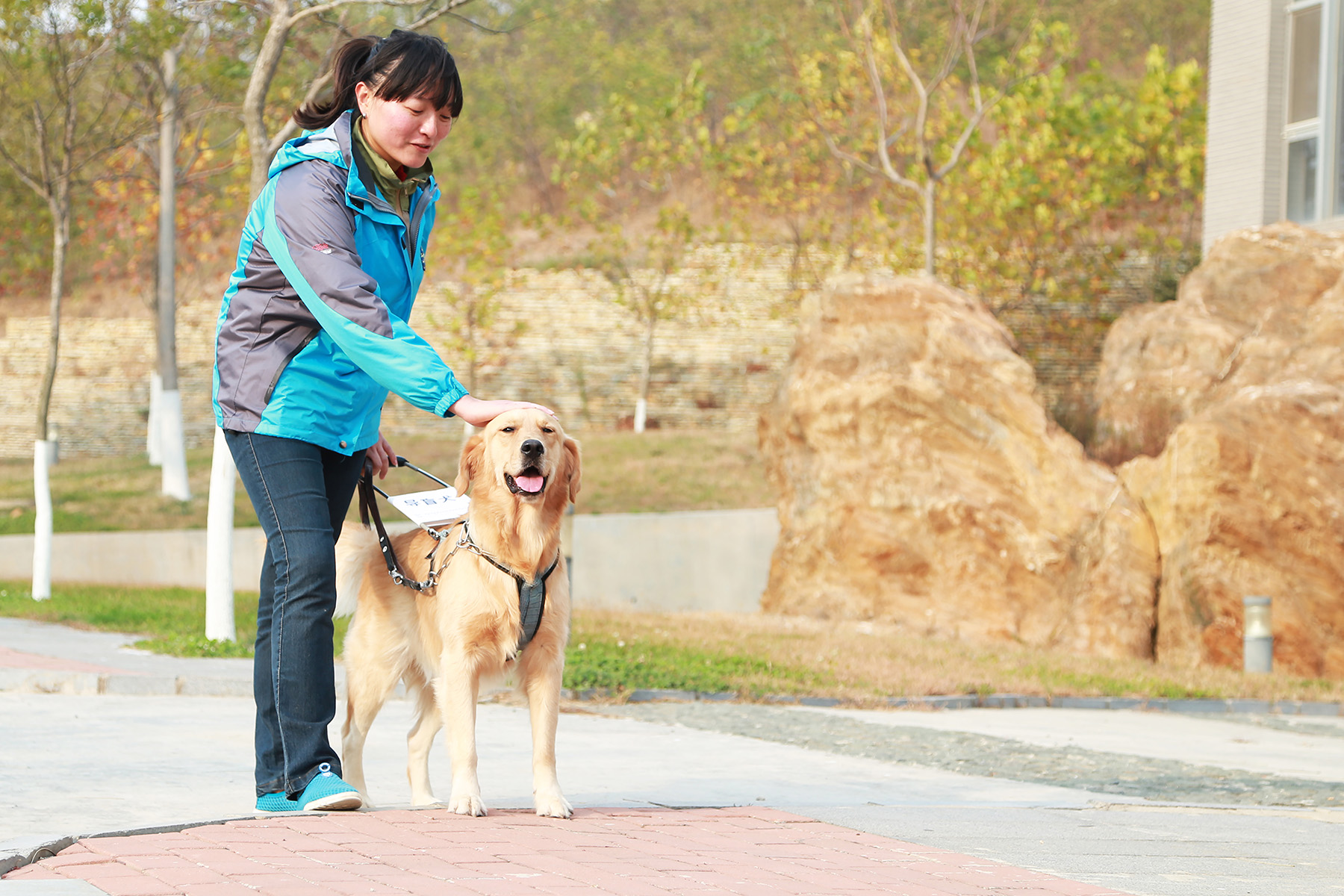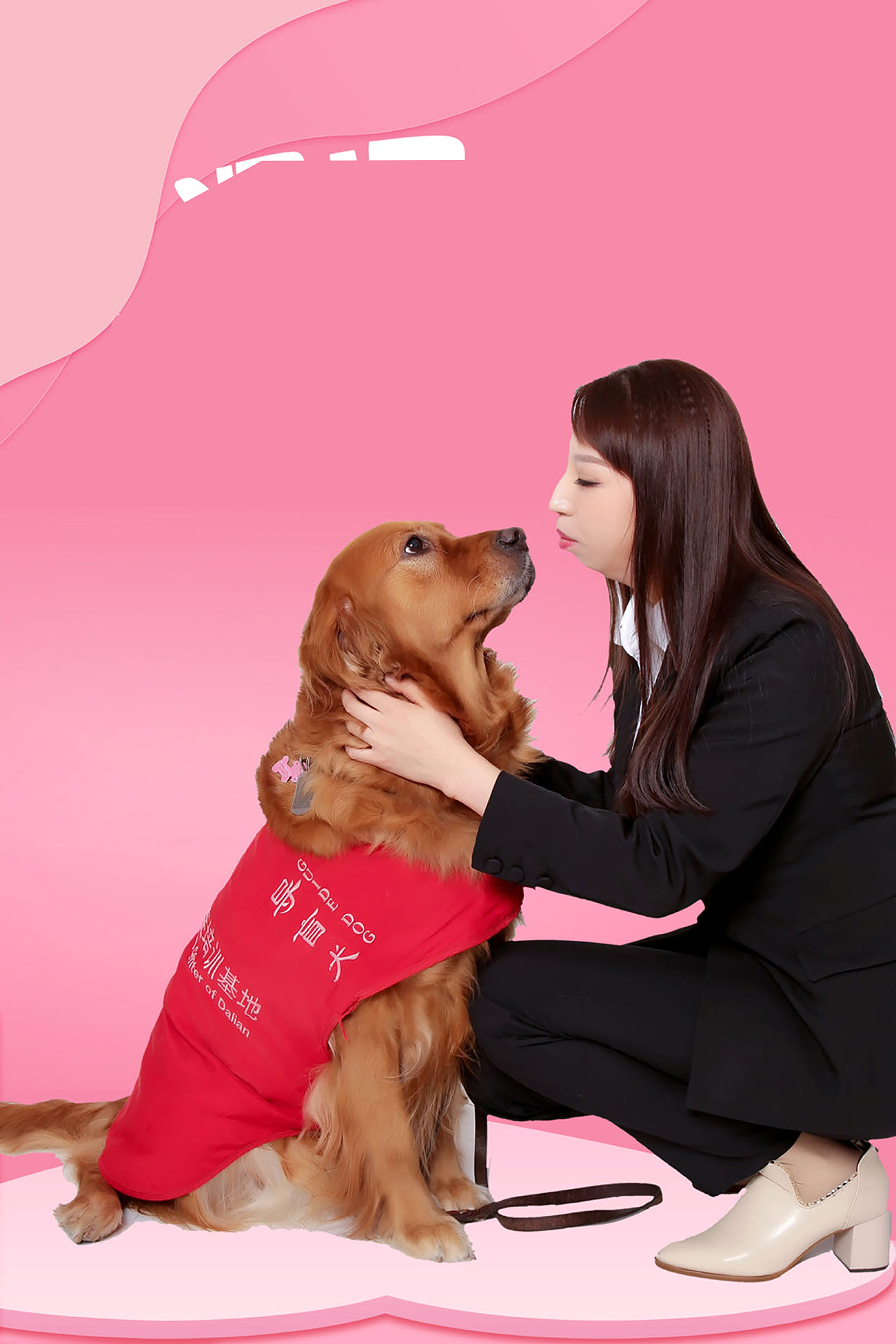On International Guide Dog Day, challenges faced by guide dog users highlight ongoing struggles for the visually impaired community, Meng Wenjie reports.

Every year, the last Wednesday of April, which falls on April 24 this year, is celebrated as International Guide Dog Day, a commemoration that reminds us how traveling with a guide dog remains challenging.
Even though Chinese law has allowed guide dogs in public places since 2008, and despite continuous improvements in public transportation over the years, Xu Jian, who is visually impaired and living in Shenzhen, Guangdong, still faces resistance from establishments like restaurants and hotels with her guide dog.
"Every time I go out, it takes a lot of communication to make sure I'm treated fairly," she said.
Xu, 43, has been battling a degenerative retinal disease since primary school. Despite losing her eyesight, she pursued education and now works as a senior operations specialist at a coworking space. However, she's always wanted greater independence.
READ MORE: Meet China's first corgi police dog
So, in 2016, Xu applied for a guide dog at the China Guide Dog Training Center in Dalian, Northeast China's Liaoning province. After waiting for over a year, she welcomed Daimeng into her life.
For the past seven years, Xu's guide dog Daimeng has faithfully accompanied her to work and throughout her daily activities.
The Dalian center, founded in 2006 by Wang Jingyu, a professor at Dalian Medical University, operates as a nonprofit organization. It is the first guide dog training facility on the Chinese mainland.

Over the years, the center has trained about 400 guide dogs, with more than 350 currently serving in 27 provinces and cities nationwide.
Despite these achievements, Wang said that China has over 17.3 million visually impaired individuals, nearly three times the population of Dalian.
"Many people express interest in guide dog training, but few stay committed," Wang said. He explained that the training of a guide dog at the center demands a minimum investment of 210,000 yuan ($28,992), but the dogs are provided to visually impaired individuals free of charge.
Currently, the main funding for the Dalian center comes from governmental aid and contributions from social organizations. Dalian Medical University also provides free facilities and utilities. In 2008, the university established a guide dog volunteer association, engaging young student volunteers to support the center's daily operations.
"We currently have over 800 members, with an average age of 20," said Hao Shuting, the president of the Dalian Medical University Guide Dog Volunteer Association.
Hao, 19, explained that in addition to assisting with the center's daily work every week, they also organize various activities to raise awareness about guide dogs.
For example, during the summer vacation of 2023, a group of volunteers went back to their hometowns and displayed signs supporting guide dogs to passersby in busy locations across the country. They then shared these photos on the school website.

Another pair of eyes
According to Wang, along with the considerable training expenses, the selection and training process for guide dogs is also notably rigorous.
The Dalian center upholds its own breeding program to ensure high-quality lineage. Its research team diligently investigates the biology and genetics of guide dog breeding.
"We maintain a success rate of 40 to 50 percent in guide dog training, which is relatively high on a global scale," said Wang Xin, a trainer who has been working at the center since 2010.
She explained that 90 percent of the center's guide dogs are Labradors, valued for their gentle nature and intelligence.
Once suitable guide dog puppies are identified, they undergo personality assessments in the lab, followed by socialization techniques during foster care and further evaluations.
One volunteer, surnamed Sun, has fostered four puppies since 2019. Her first puppy, Bohe, became a working guide dog in 2021, while the other three didn't pass subsequent training and assessments. One of them was then adopted by Sun, and the other two also found loving homes through adoption.
"Raising guide dogs is quite different from raising pet dogs," said Sun. She strictly adheres to the center's guidelines for their care, including controlled feeding and teaching the dogs to reject food when necessary. She also regularly guides them along tactile paths during their outings.
After the fostering period, the dog candidates return to the center for about one and a half years of skill training, during which they learn to navigate obstacles and adjust to various road conditions.
Throughout the training process, guide dogs may be disqualified for various reasons, including their performance, physical health, personality, and psychological traits.
According to Wang Xin, an ideal guide dog should not be overly curious, excitable, or timid. "These characteristics could cause distractions during work, which can be dangerous for visually impaired individuals," she explained.
However, even if the dogs successfully pass all evaluations, they could still be disqualified if they don't enjoy the role of a guide dog, Wang Xin added. "Every guide dog that graduated from our center takes pride in its work and remains focused," she said.
Typically, guide dogs serve for six to 10 years. Those who are disqualified or retired are usually adopted by their raisers, the users themselves or their families, or volunteers.

Human connection
Wang Jingyu finds the active involvement of young people in aiding the visually impaired quite impressive. He notes that most employees at the Dalian center are under 40 years old, with those aged 26 to 30 constituting 40 percent of the staff.
Additionally, college and high school students visit the center annually to learn about guide dogs and participate in volunteer work.
"Young people are readily embracing and gaining a deeper understanding of minority groups like visually impaired individuals," he said. "These individuals are often overlooked, not because of lack of ability, but due to difficulties in traveling and limited opportunities."
Sun regularly shares her life with foster puppies on Douyin, the Chinese version of TikTok, to raise awareness about guide dogs. Some of her followers have even adopted retired guide dogs.
ALSO READ: At hospital in Dalian, animals help children
Xu is also actively working to create opportunities for visually impaired individuals. As a public welfare advocate, she co-founded a platform with her friends that offers free assistance services. This platform provides lessons in various skills, such as dubbing, Braille, music, cooking, and computer and internet communication. These lessons are tailored for the visually impaired and are taught by young volunteers.
"Some people hold the stereotype that visually impaired individuals are only suited for massage work," Xu said. "But that's not true. They have a multitude of potential, and I'm dedicated to being a bridge, opening doors for them."
What can you do?
Xu Jian shared some advice on interacting with visually impaired individuals and guide dogs at work.
Four "don'ts"
Do not call out to, touch, feed, or obstruct guide dogs while they are on duty.
One question
If you'd like to help, please ask first and communicate clearly. Do not touch or pull the visually impaired person directly.
Correct posture for assistance
- When guiding individuals with guide dogs, stand in front of the guide dog's left side to lead.
- When assisting individuals using canes, stand in front of their left side and guide them forward by offering your elbow.
Contact the writer at mengwenjie@i21st.cn


